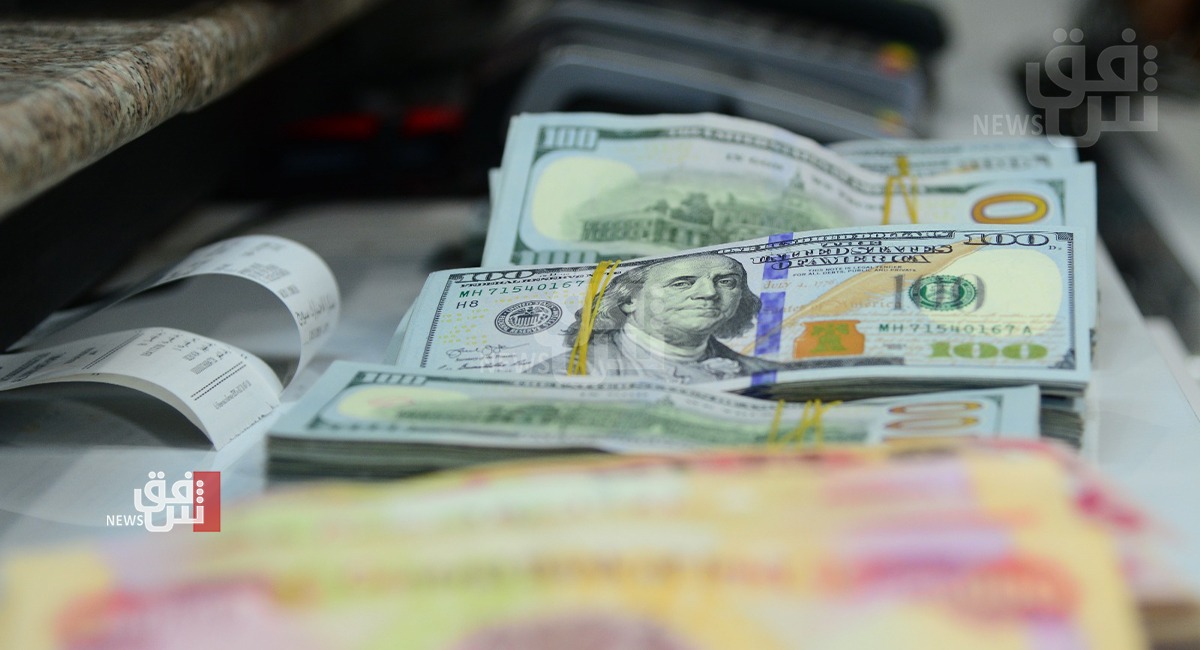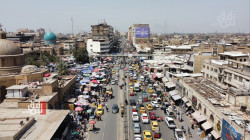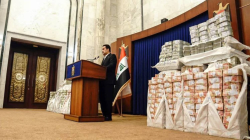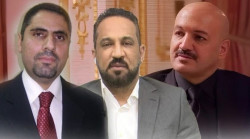Iraq's 'theft of the century': Investigators say Kadhimi's office at heart of plot

Shafaq News/ The investigative committee probing the theft of $2.5bn from an Iraqi state bank account has concluded the office of former prime minister Mustafa al-Kadhimi was instrumental in the conspiracy, a report seen exclusively by Middle East Eye reveals.
The Parliamentary Fact-Finding Committee was formed in late October after the crime, dubbed by Iraqi media the "theft of the century," became public.
It comprised MPs from various political factions and was charged with discovering how the theft was conducted and who was involved.
The committee's final report was submitted over the weekend and found that several former prime minister's team members had "facilitated the theft" while in office and helped smuggle the stolen money out of the country.
Three members of Kadhimi's office are among the most prominent figures implicated: office director and head of intelligence Raed Jouhi, private secretary Ahmed Najati, and political advisor Mashreq Abbas. Former Finance Minister Ali Allawi is also named. They deny the accusations.
On Friday, arrest warrants were issued for all four men on charges of "facilitating the seizure of tax deposits funds," and authorities were instructed to seize their assets.
The warrants were issued "following the emergence of new evidence indicating the involvement of several other figures in the previous government," according to a statement issued by the Federal Commission of Integrity (FCI), which created the committee.
Two Kuwaiti merchants of Iraqi origin, who were close to Allawi, are also being sought for arrest.
Kadhimi, who was prime minister between May 2020 and October 2022, before being replaced by Mohammed Shia al-Sudani, has decried the accusations.
He said the investigation "lacks acceptable limits of independence and indicates an open political approach in targeting and terminating everyone associated with working with the previous government."
Kadhimi accused the investigation of targeting some people to mask the "actual criminals."
Warnings ignored
Though the FCI's statement on Friday did not reveal any details of new evidence uncovered, the investigative committee's report does.
The committee found a total of four trillion dinars, "about $3bn", was withdrawn from the state-owned Rafidain Bank. It was collected through 260 cheques and distributed between seven private companies between September 2021 and August 2022.
Five of the seven companies were newly established and do not have tax records, and the remaining two were purchased by the defendants "to complete the theft," the committee found.
"None of the companies had legal authorization from the actual owners of the deposits to withdraw those deposits, despite their claim to do so," the report reads.
The stolen funds were money paid in advance by companies against future tax liabilities.
Previously, the Federal Board of Supreme Audit (FBSA), Iraq's public spending watchdog, oversaw tax deposit refund requests.
However, just a few weeks before the funds began to be stolen, a change was made to allow money to be taken out without the FBSA's permission.
The "official correspondences" surrounding that change is described as key to the theft, the investigative committee said.
The report names former chairman of the Parliamentary Finance Committee and Kadhimi financial advisor Haitham al-Jubouri, ex-director-general of the General Commission of Taxes (IGCT) Samer Abdulhadi, and former director of the FCI's investigations department Karim Badr al-Ghazi - as well as Jouhi and Allawi - as involved in these discussions.
The investigation's conclusions are consistent with MEE's reporting in November about how the theft was carried out and who is suspected of facilitating it.
A senior finance ministry official said the FBSA had previously reported the tax deposits in the account were vulnerable and attempted to warn that people may try and illicitly extract these funds. However, no one appears to have taken them seriously.
Instead, the FBSA's reports became the "master key" that allowed the plot to develop "from A to Z," the official said.
"The only ones who heeded the warnings were the thieves who were guided by these alarm bells to the location of the money and the mechanisms to access it, to steal it," he added.
Switching accounts
In November 2017, the FBSA sent the results of an audit on tax deposits for 2015, 2016, and the first four months of 2017 to the prime minister's office and the IGCT.
The audit included many observations, most notably how many tax deposits had accumulated in one account and that the refund procedures were defective and could be manipulated.
The FBSA found more than 4.9 trillion dinars (about $4bn) of tax deposits had accumulated in a bank account owned by the IGCT at Rafidain Bank's al-Ahrar branch.
The FBSA called on the finance ministry's accounting department to resolve the vulnerabilities.
In September 2018, in what appeared to be an attempt to settle the problem, the IGCT established a new bank account at Rafidain Bank's tax branch to "deposit the amounts received as tax deposits." The new account was named the "Senior Taxpayer Department."
The plan was to freeze the old account in preparation for its final closure after six months, "a matter that was not adhered to, contrary to what was specified in the directives of the accounting department," the report revealed.
The IGCT transferred over four trillion dinars from the old account to the new one, which IGCT official Abdulhadi controlled.
The transfer occurred in payments that began in August 2018 and ended in November 2020.
The committee noted that the funds once again accumulated in this new account, where they were stolen from.
"All the information revealed by the investigations so far indicates that planning for the robbery started between 2018 and 2020," a senior Iraqi official familiar with the investigations told MEE.
"The network of those involved is wide and includes political leaders, commanders of armed factions, and former and current senior officials. But the name repeated at every investigation stage is Raed [Jouhi]," he added.
"It is strange that all the other names either lead to him or are related to him somehow."
'Broad powers'
The committee's report does not specify the exact role that Jouhi is alleged to have played in this process, but it names the prime minister's office as one of the key parties involved in the theft.
It says the office contacted finance ministry officials and the directors of the IGCT and relevant bank branches without referring to Allawi, the finance minister, and instructed: "the concerned authorities to remove the FBSA from auditing requests for refunding tax deposits."
Jouhi is named in the report at several stages.
The director of Kadhimi's office, who rose to prominence as a chief investigative judge during the trial of Saddam Hussein, was appointed inspector general of the finance ministry in May 2019 by then-prime minister Adel Abdul-Mahdi.
Jouhi held the position until the Iraqi parliament abolished the post that October, but Kadhimi brought him back to the fore nine months later by appointing him as director of his office. He was given "very broad" powers, a former member of Kadhimi's team told MEE.
Elsewhere, the report details how investigations found that Alaa Khalaf Maran, Jouhi's private secretary, regularly escorted businessman Nour Zuhair Jassim, the main suspect of theft, on his foreign trips using Zuhair's private plane over the past two years.
The records of the civil aviation authority, which the fact-finding committee used, revealed that Maran and Zuhair were often accompanied by a third person, Major General Diaa al-Musawi, director of operations in the intelligence service.
Kadhimi, who remained head of intelligence for the first two years of his premiership, appointed Jouhi as his successor in the agency in July 2022. Jouhi had no noticeable background in intelligence.
The committee found that Maran was also a friend of Karim Badr al-Ghazi, director of the FCI's investigations department. Ghazi told the committee that Maran invited him and Zuhair on several trips.
In November, an arrest warrant was issued against Musawi "for his involvement in facilitating the smuggling of stolen money out of Iraq."
Investigators could not reach Musawi or Jouhi and were told by the National Intelligence Service that the former "fled Iraq" and the latter had been "transferred."
The committee said that despite its repeated requests to get any details about Jouhi, the intelligence service did not reveal where he was "transferred" to or why an administrative order was issued for his transfer.
'The joke of the century
The fact-finding committee found that Zuhair carried a diplomatic passport issued by the Iraqi foreign ministry with the title of businessman.
It also said two arrest warrants and travel bans had been issued against him in October 2019 and December 2020 for allegedly issuing cheques for accounts without the requisite funds.
"However, he is not registered in the wanted database," the report said. This allowed him to make 21 foreign flights on his private plane in 2021 and 2022.
Zuhair was arrested at Baghdad International Airport in October, and later authorities seized about 182 billion dinars ($125m) from him. Still, the investigative judge released him on bail after striking a deal to return the money in his possession and name other suspects, a prominent Iraqi official familiar with the investigation told MEE. MEE has previously attempted contact with Zuhair.
"I was shocked when I read the results of the investigations. This is the joke of the century, not the theft of the century," the Iraqi official said.
"Nour Zuhair, who was a wanted man, carried a diplomatic passport and was accompanied by a high-ranking intelligence officer or an official from the prime minister's office on every trip," he added.
"The only explanation is that he transferred the money using his private plane. There is no other explanation."





